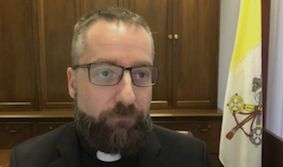Statement by Holy See at UN forum on sustainable development

Mgr Fredrik Hansen
Source: Vatican News
Yesterday, Monsignor Fredrik Hansen, Chargé d'Affaires ad interim of the Permanent Observer Mission of the Holy See to the UN, addressed the 2021 High-Level Political Forum on Sustainable Development on the topic of "SDGs in focus: how do we get on track to end poverty and hunger, and transform towards inclusive and sustainable economies."
Mgr Hansen began by welcoming the efforts of this year's High-Level Political Forum to focus on ending poverty and hunger, especially given the impact of Covid-19, which, he said, has reversed many gains toward meeting the 2030 Agenda for Sustainable Development. He urged that poverty eradication strategies be strengthened and integrated in post-pandemic recovery measures and encompass the new forms of poverty, like "pharmaceutical poverty" and increased food insecurity, that have been revealed or caused by the pandemic.
He highlighted the Holy See's and the Catholic Church's role in providing assistance to the poor and alleviating hunger for those in need and said the international community "must come together and renew its commitment to multilateralism" in order to meet the needs of the poor and respect the inherent dignity of every person.
The full text of his remarks follow.
Statement by Mgr Fredrik Hansen, Chargé d'Affaires ad interim of the Holy See to the United Nations, at the 2021 High-Level Political Forum on Sustainable Development on "SDGs in focus: How do we get on track to end poverty and hunger, and transform towards inclusive and sustainable economies?"
New York, 7 July, 2021
Madam Moderator,
The Holy See welcomes the focus of this year's High-Level Political Forum on "Sustainable and resilient recovery from the Covid-19 pandemic that promotes the economic, social and environmental dimensions of sustainable development: building an inclusive and effective path for the achievement of the 2030 Agenda in the context of the decade of action and delivery for sustainable development," and is grateful to offer a few considerations during this thematic session.
The year 2020 was unprecedented. The Covid-19 pandemic has claimed over three million lives, upended all spheres of human life and devastated the global economy. While the complete picture of the long-term impacts of the pandemic will only be known in time, it is beyond doubt that its impact on the implementation of the 2030 Agenda for Sustainable Development has been dramatic. Hard-won development gains have been reversed and many of the sustainable development goals - some within reach only two years ago - will now require extraordinary efforts to be met by the end of this decade.
This is particularly evident for SDG 1. The pandemic has proven to be "a portent of poverty."[1] An additional 119 to 124 million people were pushed into extreme poverty in 2020, the informal economy, which employs most of the working poor, has been severely impacted and, as a result, millions of people have lacked access to basic resources.[2]
To reverse this alarming trend, it is essential that poverty eradication strategies are strengthened and fully integrated in the designing of recovery measures from the COVID-19 pandemic. Indeed, eradicating poverty in all its forms and dimensions, including extreme poverty, remains "the greatest global challenge and an indispensable requirement for sustainable development."[3]
In this regard, the Holy See and the Catholic Church will continue to play its role in providing charitable assistance to the poor by reaching them "in their homes, in hospitals and nursing homes, on the streets and in the dark corners where they sometimes hide, in shelters and reception centres."[4]
Moreover, recovery measures should aim at addressing the new forms of poverty caused by the pandemic, especially what Pope Francis has called "pharmaceutical poverty."[5] The alarming proportion of those who still lack access to vaccines clearly demonstrates that poverty is not merely about the lack of money to survive from day to day, but rather the absence of economic and social justice as a whole. Ensuring that all countries, in particular the poorest, have equitable access to vaccines is an ethical imperative and a common responsibility. It requires the steadfast commitment of the entire international community.
Equally alarming is the number of those who, as a result of the COVID-19 pandemic, go hungry, are food insecure and suffer from different forms of malnutrition. The severe disruption of food systems, societies and economies, as well as the devastating impact of the pandemic on the livelihoods of so many have caused an explosion in the number of men, women and children edging closer to the brink of starvation. Also in alleviating hunger, the Catholic Church, through her many organizations, initiatives and charities present on the ground throughout the world, is at the forefront of efforts to distribute daily meals, which, for those most in need, represent the primary, if not the only, source of safe, sufficient and nutritious food.
In the face of these monumental challenges, the Holy See believes it is vital that the international community must come together and renew its commitment to multilateralism "as the expression of a renewed sense of global co-responsibility, a solidarity grounded in justice and the attainment of peace and unity within the human family."[6] This means working together in service of the common good, avoiding individualism and divisions, and generating development processes in which the inherent dignity of every person is respected, the abilities of everyone are valued, and the needs of the poor are met.
Thank you, Madam Moderator.
[1] Pope Francis, Message for the Fifth World Day of the Poor, 14 November 2021.
[2] Cf. Progress towards the Sustainable Development Goals, report of the UN Secretary-General (E/2021/58).
[3] Transforming Our World: the 2030 Agenda for Sustainable Development (A/RES/70/1), preamble.
[4] Pope Francis, Message for the Fifth World Day of the Poor, 14 November 2021.
[5] Pope Francis, Address to the Members of the Banco Farmaceutico Foundation, 19 September 2020.
[6] Pope Francis, Address to the seventy-fifth session of the United Nations General Assembly, 25 September 2020.















